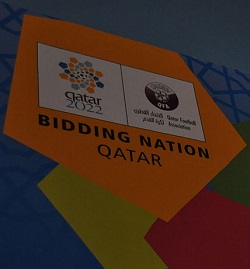The past few months have been challenging for the Fédération Internationale de Football Association (FIFA). Sony announced that it will not renew its sponsorship contract with FIFA, following a similar announcement from Emirates Airlines earlier this month. Recent allegations of bribery resulted in an internal ethics investigation, while more than 1,200 migrant workers have died building stadiums for the 2022 FIFA World Cup in Qatar. With reports estimating that an additional 4,000 migrant workers could die if the tournament takes place in Qatar as scheduled, FIFA is no doubt anxiously waiting to see if Sony and Emirates Airlines will be the first of many companies to pull sponsorship from the organization.
FIFA has fielded a barrage of questions regarding the abuses migrant workers face while building the infrastructure for the Qatar World Cup. The problem is a system of regressive Qatari labor laws, which utilize the outdated kafala system. Under kafala, employment contracts between workers and their employers amount to little more than indentured servitude. Laborers are banned from changing jobs or working for another employer without the permission of their current employer. Employers are not required to pay migrant workers a minimum wage. Often, they do not pay them at all. Migrant workers live and work in horrific conditions. Measures for recourse, which the Government of Qatar readily point to as an example of its willingness to resolve the abuses, are poorly implemented and inherently ineffectual.
The Qatari government argues that the wages of migrant workers are consensually determined between the worker and the employer under an employment contract signed by both parties, which is then approved by the Ministry of Labor. In reality, that rarely occurs. Many migrants work without contracts; if a contract is drafted, it is often in language the worker can’t understand, assuming the laborer is literate to begin with. Laborers desperate for work often lack the resources to negotiate a contract. Many have paid hefty recruitment fees to migrate for the job, which they must repay with interest.
Qatar’s abuse of its migrant workforce often begins with manipulation of the source country. The Special Rapporteur on the human rights of migrants documented that source countries attempting to set minimum wages for their workers often find that the Qatari government begins denying their migrant workers visas. While some countries, like India, have attempted to curtail the practice of withholding pay to cover immigration costs by signing labor treaties that make the Qatari employers responsible for those expenses, the Qatari government does not enforce these treaties, and those fees continue to be passed on to the migrant workers.
The Qatari government alleges that adequate complaint mechanisms are in place for workers to report abuses. However, those who utilize these systems to complain often face criminal charges by their sponsor; running away from your employer is a criminal offense in Qatar. Forced to endure lengthy detention without adequate legal representation, migrant workers who report abuse are often treated as criminals instead of victims of abuse and misconduct.
The Government of Qatar has already failed to protect the 1,200 migrant workers who lost their lives working to build new roads, hotels and stadiums for the 2022 World Cup. What will it take for the government to protect the estimated 4,000 additional workers projected to die completing these projects? The international community cannot stand by as Qatar waves existing hollow mechanisms as evidence of reform. On December 2nd, NGOs and concerned activists will rally in front of the Embassy of Qatar in Washington, DC to commemorate the United Nations International Day for the Abolition of Slavery and to call on Qatar to protect the lives and livelihoods of migrant workers in their country. An international sporting tournament should serve to celebrate human achievement, not the tarnished product of slave labor. Players, not slaves, should be holding up the World Cup.
–
Saman Naquvi is ADHRB’s Grassroots Advocacy Associate





